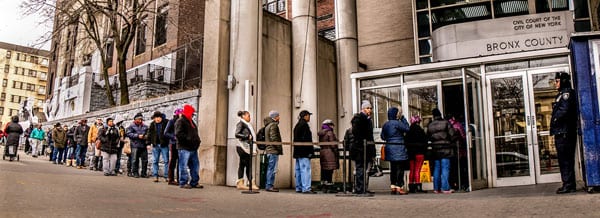
November 20, 2018; Next City
Even while Matthew Desmond was making eviction a national issue through his groundbreaking work, activists were already shining a spotlight on the inherent imbalance of unrepresented tenants in eviction courts around the country. NPQ highlighted the problem in a 2015 article on Baltimore’s “rent court,” where the vast majority of tenants went unrepresented when facing an eviction judge.
In 2016, NPQ reported on housing activists in NYC who were making claims for a right to representation in eviction court. Prompted by the Right to Counsel NYC Coalition, the City of New York established the Office of Civil Justice (OCJ) and initiated the Universal Access to Justice program. Now, that office has issued its first report on the program which provides legal representation and other services to low-income New Yorkers.
It should be no surprise to learn that expanded legal representation in NYC is reducing involuntary displacement by eviction. In the Next City analysis of the new report, Kelly Regan says, “21,955 city residents across 7,847 households who were threatened with eviction were able to remain in their homes after securing legal representation from OCJ-funded lawyers.”
Twenty nonprofit legal assistance organizations are the workforce for the OCJ eviction initiative. Besides court appearances, “OCJ’s contracted legal providers assisted New York City tenants in other legal proceedings to preserve and protect tenants’ housing and to demand or maintain habitable conditions, and in other proceedings and litigation that take place both in and outside of Housing Court.” Other legal issues include landlord harassment and retaliation. Eligibility for legal representation is based on households being below 200 percent of the federal poverty rate.
While taking a victory lap, the OCJ report falls a bit short by failing to assess the full impact of the project. According to the OCJ, the Access to Justice program costs the city of New York around $77 million dollars, but the report fails to document how much was saved by preventing involuntary displacement. There are also no details on the value of the help provided to households that received assistance in relocation or resolution of other legal issues. These reporting gaps are not fatal flaws, since the report covers the first year of a five-year “phase-in.” As NPQ’s editors wrote a decade ago, “cost-benefit” analysis has its limitations, noting that “for many nonprofits it is easiest to quantify as much as possible but also to judiciously account for benefits and costs that are not quantifiable.” Still, if cost savings do result from “doing the right thing,” such analysis may help strengthen the political case for tenant representation in other cities.
Sign up for our free newsletters
Subscribe to NPQ's newsletters to have our top stories delivered directly to your inbox.
By signing up, you agree to our privacy policy and terms of use, and to receive messages from NPQ and our partners.
The costs and benefits of eviction representation are the focus of a new study of universal representation in Philadelphia. Next City’s article, “What Philadelphia Could Gain from Expanding Legal Aid for Tenants,” describes a new report on eviction representation which was commissioned by the Philadelphia Bar Association.
This report proclaims, “With an annual investment of approximately $3.5 million, the City of Philadelphia (the “City”) could provide legal assistance to all tenants unable to afford representation, avoiding $45.2 million in costs to the City annually.”
According to this analysis, cost savings would come from:
- The education, juvenile justice, and welfare costs associated with homeless children
- The negative impact of eviction on tenants’ credit score, ability to re-rent, and the potential loss of a subsidized housing voucher
- The cost of providing public benefits when jobs are lost due to eviction
- The costs associated with homelessness, such as additional law enforcement and incarceration
- The cost of family and community instability
- Preservation of financial and personal assets, e.g. moving expenses, loss of personal belongings, loss of security deposit, court fees, and fines
- Preservation of affordable housing stock
- Enforcement of rent laws and regulations
- A reduction over time of the number of eviction cases filed, resulting in more efficient use of city and court resources
That’s a long list of benefits. Of course, some of these benefits are easier to measure than others. And, naturally, legal representation does not solve all problems. Notably, it will not make low-income housing more affordable to low-income families. (Keep in mind that universal representation was only one of two prescriptions offered by Matthew Desmond in his book, Evicted. The other was expansion of rent subsidies, along the lines of a universal renter tax credit.)
None of the foregoing should discourage innovation. Progress in preventing involuntary displacement is a positive social and economic good. Making the case based on real-life experiments is a key element in the march toward a more just society.
In today’s polarized political climate, forming alliances between liberals and conservatives is increasingly difficult. Still, eviction representation fits in with efforts to promote bail reform, sentencing reform, and reentry programs that seek to reduce long-term public expenditures by short-term spending. Collaboration between small government conservatives and social justice advocates just might, at least in some cases, help myopic city councils and state legislatures see a brighter future.—Spencer Wells













